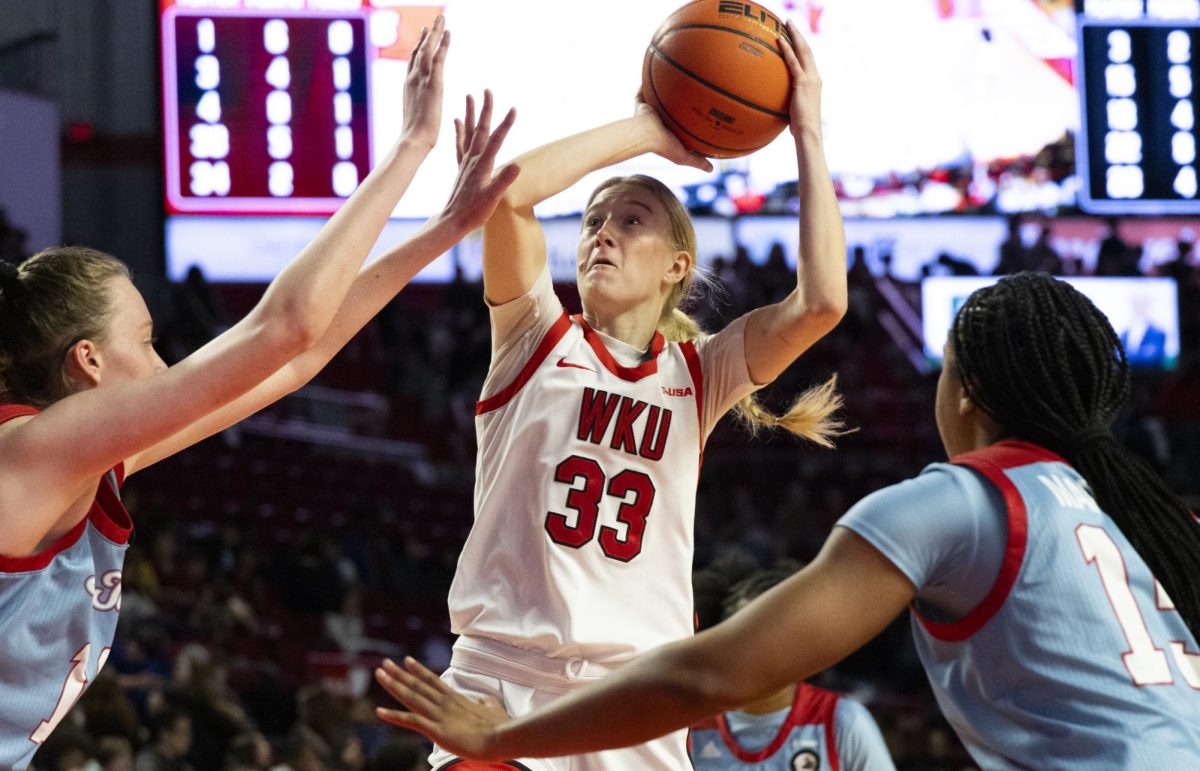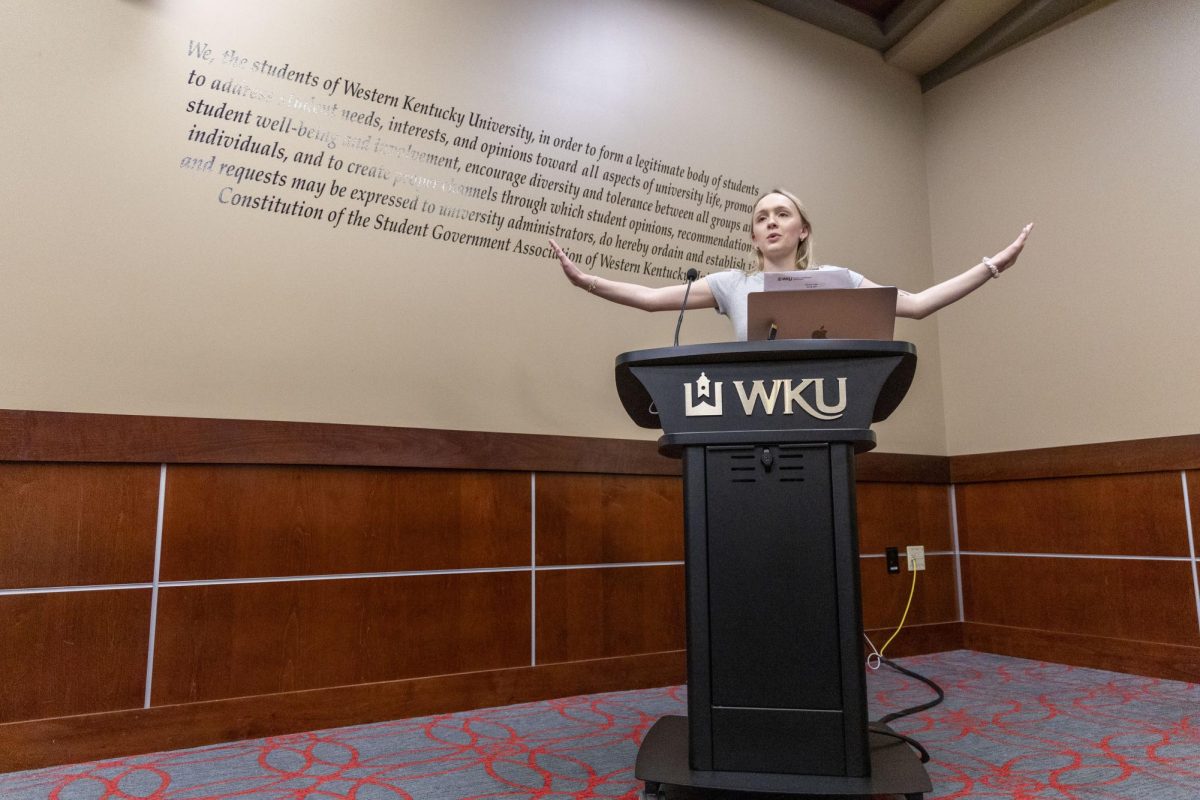6 important stories you missed this summer
August 27, 2018
WKU experienced significant administrative changes this summer, including tuition increases, position changes and a shift in the university’s direction as a whole for the next decade.
Here are six important stories for the WKU community to catch up on from this summer.
WKU’s tuition increases
WKU experienced increases over the summer to the in-state undergraduate, out-of-state undergraduate and international student tuition rates.
For in-state undergraduate tuition, students saw a 4 percent increase, increasing the semester rates go from $5,101 to $5,301. Out-of-state undergraduate tuition increased by at least 3 percent, from $12,756 to $13,248 per semester. International students saw their bills increase from $13,080 a semester to $13,572.
WKU’s online course fee also increased from $100 to $150 this summer, raising the cost of a standard 3-hour online class from $300 to $450.
The Board of Regents approved the tuition and online course fee increases when it approved the 2018-19 operating budget in a 10-1 vote on June 22.
Student regent and student body president Stephen Mayer voted against the budget, citing his concern that the fee and tuition increases placed a burden on the students.
“In regards to students, unfortunately, we’re taking a hit here,” Mayer said after the board meeting. “I’m going to fight in this next year so that maybe we don’t see any more increases in any kind of student fees for the next year in the development of the next budget, as I will see the development of the next budget from start to finish.”
The tuition increases will be used to fund pay raises for WKU faculty and staff and create a 4 percent salary increase pool. Caboni announced at convocation that all faculty and staff who were hired on or before July 1 will receive a 2 percent salary increase and will be eligible for a 4 percent merit increase, as previously reported by the Herald.
Changes to WKU’s admission standards
Under new admission standards announced by WKU on July 25, incoming freshmen with a cumulative high school GPA below 2.0 will no longer be admitted. Incoming freshmen must have at least a 2.0 cumulative unweighted GPA and have a Composite Admissions Index (CAI) score of at least 60, as reported by the Herald July 25.
Students who are admitted with a cumulative high school GPA between 2.0 and 2.49 will be asked to complete the newly-formed 2019 WKU Summer Scholars program, a five-week transition program that will begin in July of each year.
President Timothy Caboni announced the Summer Scholars program at the faculty and staff convocation Friday. During the program, students will take two courses for six credit hours and live in the same room where they will live during the fall semester.
“We’re going to help prepare them for what it means to do rigorous academic work here at WKU,” Caboni said. “Not just in their first semester, and not just in their first year, but for all four years.”
WKU’s former provost David Lee, who originally announced the changes, said in an email the new minimum admission requirements for Kentucky public four-year institutions, including WKU, were voted on by the Kentucky Council on Postsecondary Education (CPE) in June, including no longer admitting incoming freshmen with a GPA below 2.0.
Lee said that from the fall 2017 incoming class, 102 enrolled freshmen would not have been eligible for admission under the new requirements. Of those students who would no longer be admitted, “fewer than one in three would persist past the first year,” and 7.3 percent would graduate in six years, he said.
“Despite the budgetary challenges that we are navigating, we cannot in good conscience continue to enroll underprepared students who have very little chance of success,” Lee said.
WKU’s 10-year strategic plan
The university’s 10-year strategic plan was approved by the Board of Regents Aug. 3, shaping the university for the next decade.
The plan aims at improving student enrollment and retention and its creation took place over the last year with six working groups meeting throughout the year.
The 2018-28 strategic plan includes three sections: the students, the university and the community. For every part, the plan provides goals, strategies and metrics, or ways of measuring the success of the goals with possible targets for 2027-28.
“I’m looking forward to moving swiftly toward implementation of what I think is a remarkable community-centered inclusive process that created this plan,” Caboni said at the board’s annual retreat.
Some faculty and staff voiced concerns about the new “Comprehensive Advising Program” outlined in the plan, which focuses on advising first-and-second-year students and addressing their academic, financial, physical, mental and social questions.
These faculty and staff said they felt like it may not be as beneficial to the students because central advisers may not be able to answer students’ questions for a specific major or department, as reported by the Herald Aug. 3.
WKU’s former advising method included professors meeting individually with students about their class schedules within specific colleges.
“If what we have now was working, then our retention rate would not be what it is,” Caboni said during the board meeting Aug. 3 regarding the university’s current method of advising.
Meet WKU’s new provost, Terry Ballman
During the summer, WKU met its new provost, Terry Ballman, when she assumed her position Aug. 1. Ballman was the dean of the College of Arts and Letters at California State University, San Bernardino.
Ballman grew up in California and earned her bachelor’s degree in Spanish and a master’s in Latin American literature from California State University at Long Beach. She also received her Ph.D. in Hispanic linguistics from the University of Texas at Austin.
She previously worked at Western Carolina University, University of Northern Colorado, California State University in Long Beach and Binghamton University in New York.
As provost, Ballman will be involved in hiring a new dean for WKU’s Graduate School, College of Health and Human Services and Gordon Ford College of Business.
Ballman expressed her enthusiasm for working with the faculty at WKU in particular. She said she felt like her faculty experiences can help her connect with the faculty members she will now be working with.
“If I’m here to support faculty, it has served me well that I was a faculty member for years at different universities,” Ballman said. “I understand the role, I understand the demands, and I understand the benefits.”
Describing herself as student-centered, Ballman said that some of her fondest memories as a faculty member have come from former students who told her that she made a difference in their lives.
“I can never forget who we serve,” Ballman said. “We serve students at the end of the day.”
WKU ranked fourth in performance-based state funding
The state of Kentucky divided $31 million to its public colleges based on performance, and WKU received the fourth-largest amount of funding, according to information provided by the Kentucky Council on Postsecondary Education.
WKU received about $3.75 million in state performance funding. The University of Kentucky earned the largest amount of funding, $9.1 million. The University of Louisville only received $2.5 million.
This was the second year the council divided performance-based funding to all of the state’s public colleges using the Performance Funding Model. The three basic components of the model include student success, course completion and operational support. The model was signed into law as the new method of deciding state performance funding by Gov. Matt Bevin on March 21, 2017, as reported by the Herald Aug. 1.
William Payne, vice president of finance and administration at the council, said the performance funding will be added to each public college’s total state appropriations for 2018-19.
In WKU’s 2017-18 budget, the university received $3.8 million in-state performance funding and received $74.7 million in total state appropriations. This year, WKU will earn $81,600 less in performance funding from the state.
In WKU’s 2018-19 operating budget, given the university’s performance funding amount, total state appropriations will account for $73.8 million, or about 19 percent of the budget.
WKU has spent more than $26,000 on Herald lawsuit
WKU has spent more than $26,000 in legal fees for its ongoing lawsuit against the College Heights Herald, according to an open records request by the Herald.
From the time WKU sued the Herald in February 2017 until March 2, the total cost of the university’s expenses paid from attorney billing records at the Kerrick Bachert Law Firm and hours worked by its attorneys was $26,381.38.
The university sued the Herald after denying an open records request by former Herald reporter Nicole Ares in November 2016 for records concerning sexual misconduct allegations against employees at the university. The lawsuit is ongoing and oral arguments took place on April 6.
The Herald’s fees have totaled more than $46,000, according to an email from Herald attorney Michael Abate with Kaplan Johnson Law June 30.
The Herald has received grants and donations to continue fighting WKU’s lawsuit. They include a $10,000 grant from the Kentucky Press Association Legal Defense Fund, a $5,000 grant from the Society of Professional Journalists Legal Defense Fund and about $7,000 in donations by Herald and Talisman alumni through the College Heights Herald Fund established by the Student Press Law Center.
Nicole Ziege can be reached at 270-745-6011 and nicole.ziege825@topper.wku.edu. Follow Nicole Ziege on Twitter at @NicoleZiege













